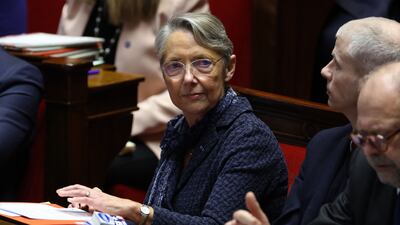There will be no backtracking on the plan to raise the retirement age in France, Prime Minister Elisabeth Borne said on Sunday, as unions prepared for another day of mass protests and strikes against the reform.
A reform package pushed by President Emmanuel Macron will mean the minimum retirement age moves to 64 from 62 as part of plans to ensure the future financing of France's pensions system.
The French government signalled there was wiggle room on some measures after union protests against the change sent more than a million people into the streets across the country on January 19.
They included special deals for people who started working very young, and provisions for mothers who interrupted their careers to look after their children and for people who invested in further education.
But the headline age limit of 64 is not up for discussion, Ms Borne said on Sunday.
"This is now non-negotiable," she told the FranceInfo broadcaster.
While unions have welcomed the government's readiness for negotiation on parts of the plan, they say the proposed 64-year rule has to go.
Calling the reform "unfair", France's eight major unions, in a rare show of unity, said they hoped to "mobilise even more massively" on Tuesday, their next scheduled protest day.
On that occasion, the government put the turnout at 1.1 million, while the unions said more than two million.
"It's looking like there will be even more people," said Celine Verzeletti, member of the hard-left union CGT's confederation leadership.
Laurent Berger, head of the moderate CFDT union, said opinion polls showed "the people disagree strongly with the project, and that view is gaining ground".
It would be "a mistake" for the government to ignore the protesters, Mr Berger warned.
Communist party leader Fabien Roussel called Ms Borne's remark "a provocation", saying she was "blinkered" and her government "inflexible".
Marine Le Pen, leader of the far-right National Rally, repeated her opposition to the government's "unjust and brutal" plans.
Unions and the government both consider Tuesday's protests to be a major test.
About 200 protests are being organised countrywide, with a major march planned for Paris culminating in a demonstration outside the National Assembly, where parliamentary committees will start examining the draft law on Monday.
The left-wing opposition has submitted more than 7,000 amendments to the draft to try to slow its path through Parliament.
Mr Macron's allies, short of an absolute majority in Parliament, will need votes from conservatives to have their pensions plan approved.
The government has the option of forcing the bill through without a vote under special constitutional powers, but that risks a vote of no confidence, and possibly new parliamentary elections.
On Sunday evening, Ms Borne met several of her ministers and senior government officials to discuss how to proceed.
Unions have called for widespread strike action for Tuesday, with railway services and other public transport expected to be heavily affected.
Stopworks are also expected in schools and administrations, with some local authorities having already announced closures of public spaces such as sports stadiums.
For people using public transport, Tuesday will be "difficult, or even very difficult", Transport Minister Clement Beaune said Sunday, calling on commuters to postpone trips and work from home where possible.
Some unions have called for more strike action in February, including at commercial ports, refineries and power stations.
Observers say the unions are playing for high stakes and any slackening of support on Tuesday could be fatal for their momentum.
"They have placed the bar high," said Dominique Andolfatto, a professor of political science. "They can't afford any missteps."


